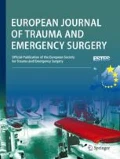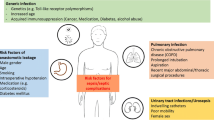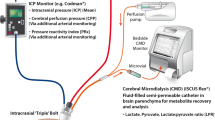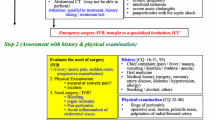Abstract
Purpose
To review the frequency, different patterns, anatomic severity, management, and prognosis of abdominal injuries in survivors of explosions, according to the main mechanism of injury.
Methods
A MEDLINE search was conducted from January 1982 to August 2013, including the following MeSH terms: blast injuries, abdominal injuries. EMBASE was also searched, with the same entries. Abdominal blast injuries (ABIs) have been defined as injuries resulting not only from the effects of the overpressure on abdominal organs, but also from the multimechanistic effects and projectile fragments resulting from the blast. Special emphasis was placed on the detailed assessment of ABIs in patients admitted to GMUGH (Gregorio Marañón University General Hospital) after the Madrid 2004 terrorist bombings, and in patients admitted to HYMC (Hillel Yaffe Medical Centre) in Hadera (Israel) following several bombing episodes. The anatomic severity of injuries was assessed by the abdominal component of the AIS, and the overall anatomic severity of casualties was assessed by means of the NISS.
Results
Abdominal injuries are not common in survivors of terrorist explosions, although they are a frequent finding in those immediately killed. Primary and tertiary blast injuries have predominated in survivors from explosions in enclosed spaces reported outside of Israel. In contrast, secondary blast injuries causing fragmentation wounds were predominant in suicide bombings in open and/or semi-confined spaces, mainly in Israel, and also in military conflicts. Multiple perforations of the ileum seem to be the most common primary blast injury to the bowel, but delayed bowel perforations are rare. Secondary blast injuries carry the highest anatomic severity and mortality rate. Most of the deaths assessed occurred early, with hemorrhagic shock from penetrating fragments as the main contributing factor. The negative laparotomy rate has been very variable, with higher rates reported, in general, from civilian hospitals attending a large number of casualties.
Conclusions
The pattern, severity, management, and prognosis of ABI vary considerably, in accordance with the main mechanism of injury.
Similar content being viewed by others
References
Champion HR, Holcomb JB, Young LA. Injuries from explosions: physics, biophysics, pathology, and required research focus. J Trauma. 2009;66:1468–77.
Centers for Disease Control. Explosions and blast injuries: a primer for clinicians. Atlanta: Centers for Disease Control; 2007.
Beekley AC, Blackbourne LH, Sebesta JA, McMullin N, Mullenix PhS, Holcomb JB. Selective nonoperative management of penetrating torso injury from combat fragmentation wounds. J Trauma. 2008;64:108–17.
Holcomb JB, McMullin NR, Pearse L, et al. Causes of death in US. Special operations forces in the global war on terrorism: 2001–2004. Ann Surg. 2007;245:986–91.
Owens BD, Kragh JF, Wenke JC, Macaitis J, Wade CE, Holcomb J. Combat wounds in Operation Iraqi Freedom and Operation Enduring Freedom. J Trauma. 2008;64:295–9.
Belmont PJ Jr, McCriskin BJ, Sieg RN, Burks R, Schoenfeld AJ. Combat wounds in Iraq and Afghanistan from 2005 to 2009. J Trauma Acute Care Surg. 2012;73:3–12.
Kluger Y, Mayo A, Hiss J, et al. Medical consequences of terrorist bombs containing spherical metal pellets: analysis of a suicide terrorist event. Eur J Emerg Med. 2005;12:19–23.
Almogy G, Belzberg H, Mintz Y, et al. Suicide bombing attacks. Update and modifications to the protocol. Ann Surg. 2004;239:295–303.
Almogy G, Luria T, Richter E, et al. Can external signs of trauma guide management? Lessons learned from suicide bombing attacks in Israel. Arch Surg. 2005;140:390–3.
Almogy G, Mintz Y, Zamir G, et al. Suicide bombing attacks: can external signs predict internal injuries? Ann Surg. 2006;243:541–6.
Bala M, Rivkind AI, Zamir G, et al. Abdominal trauma after terrorist bombing attacks exhibits a unique pattern of injury. Ann Surg. 2008;248:303–9.
Yasin MMA, Nasreen G, Malik SA. Injury pattern of suicide bomb attacks in Pakistan. Eur J Trauma Emerg Surg. 2012;38:119–27.
Gennarelli TA, Wodzin E. AIS 2005: a contemporary injury scale. Injury. 2006;37:1083–91.
Osler T, Baker SP, Long W. A modification of the injury severity score that both improves accuracy and simplifies scoring. J Trauma. 1997;43:922–5.
Ramasamy A, Harrison SE, Stewart MPM, Midwinter M. Penetrating missile injuries during the Iraqi insurgency. Ann R Coll Surg Engl. 2009;91:551–8.
Brismar B, Bergenwald L. The terrorist bomb explosion in Bologna, Italy, 1980: an analysis of the effects and injuries sustained. J Trauma. 1982;22:216–20.
Pyper PC, Graham WJH. Analysis of terrorist injuries treated at Craigavon Area Hospital, Northern Ireland, 1972–1980. Injury. 1982;14:332–8.
Frykberg ER, Tepas JJ. Terrorist bombings: lessons learned from Belfast to Beirut. Ann Surg. 1988;208:569–76.
Frykberg ER, Tepas JJ 3rd, Alexander RH. The 1983 Beirut airport terrorist bombing. Injury patterns and implications for disaster management. Am Surg. 1989;55:134–41.
Rignault DP, Deligny MC. The 1986 terrorist bombing experience in Paris. Ann Surg. 1989;209:368–73.
Katz E, Ofek B, Adler J, et al. Primary blast injury after a bomb explosion in a civilian bus. Ann Surg. 1989;209:484–8.
Shenoy SG, Pai PR, Dalvie S, Bapat RD. Analytical data of March 1993 blast victims—the KEM Hospital experience. J Postgrad Med. 1993;39:10–3.
Mallonee S, Shariat Sh, Stennies G, Waxweiler R, Hogan D, Jordan F. Physical injuries and fatalities resulting from the Oklahoma City bombing. JAMA. 1996;276:382–7.
Biancolini CA, Del Bosco CG, Jorge MA. Argentine Jewish community institution bomb explosion. J Trauma. 1999;47:728–32.
Rodoplu Ü, Arnold JL, Yücel T, Tokyay R, Ersoy G, Cetiner S. Impact of the terrorist bombings of the Hong Kong Shanghai Bank Corporation headquarters and the British consulate on two hospitals in Istanbul, Turkey, in November 2003. J Trauma. 2005;59:195–201.
Rodoplu Ü, Arnold JL, Tokyay R, Ersoy G, Cetiner S, Yücel T. Impact of the terrorist bombings of the Neve Shalom and Beth Israel synagogues on a hospital in Istanbul. Acad Emerg Med. 2005;12:135–41.
Aylwin CJ, König TC, Brenan NW, et al. Reduction in critical mortality in urban mass casualty incidents: analysis of triage, surge, and resource use after the London bombing on July 7, 2005. Lancet. 2006;368:2219–25.
Torkki M, Virve K, Kirsi S, et al. Triage in a bomb disaster with 166 casualties. Eur J Trauma. 2006;32:374–80.
Deshpande AA, Mehta S, Kshirsagar NA. Hospital management of Mumbai train blast victims. Lancet. 2007;369:639–40.
Turégano-Fuentes F, Caba-Doussoux P, Jover-Navalón JM, et al. Injury patterns from major urban terrorist bombings in trains: the Madrid experience. World J Surg. 2008;32:1168–75.
Ashkenazi I, kessel B, Olsha O, et al. Defining the problem, main objective, and strategies of medical management in mass-casualty incidents caused by terrorist events. Prehosp Disaster Med. 2008;23:82–9.
Ignjatovic D. Blast injuries of the intestines in abdominal injuries. Vojnosanit Pregl. 1994;51:3–12.
Wani I, Parray FQ, Sheikh T, et al. Spectrum of abdominal organ injury in a primary blast type. World J Emerg Surg. 2009;4:46.
Paran H, Neufeld D, Schwartz I, et al. Perforation of the terminal ileum induced by blast injury: delayed diagnosis or delayed perforation? J Trauma. 1996;40:472–5.
Leibovici D, Gofrit ON, Stein M, et al. Blast injuries: bus vs. open-air bombings—a comparative study of injuries in survivors of open-air vs. confined-space explosions. J Trauma. 1996;41:1030–5.
Kosashvili Y, Loebenberg MI, Lin G, et al. Medical consequences of suicide bombing mass casualty incidents. The impact of explosion setting on injury patterns. Injury. 2009;40:698–702.
Arnold JL, Halpern P, Tsai M, Smithline H. Mass casualty terrorist bombings: a comparison of outcomes by bombing type. Ann Emerg Med. 2004;43:263–73.
Hill JF. Blast injury with particular reference to recent terrorist bombing incidents. Ann R Coll Surg Engl. 1979;61:4–11.
Cooper GJ, Maynard RL, Cross NL, et al. Casualties from terrorist bombings. J Trauma. 1983;23:955–67.
Ritenour AE, Baskin TW. Primary blast injury: update on diagnosis and treatment. Crit Care Med. 2008;36:311–7.
Ritenour AE, Blackbourne LH, Kelly JF, et al. Incidence of primary blast injury in US Military Overseas Contingency Operations. A retrospective study. Ann Surg. 2010;251:1140–4.
Stein M. Urban bombing: a trauma surgeon′s perspective. Scand J Surg. 2005;94:286–92.
Brethauer SA, Chao A, Chambers LW, et al. Invasion vs. insurgency: US Navy/Marine Corps forward surgical care during Operation Iraqi Freedom. Arch Surg. 2008;143:564–9.
Owers C, Morgan JL, Garner JP. Abdominal trauma in primary blast injury. Br J Surg. 2011;98:168–79.
Ramasamy A, Harrison SE, Clasper JC, Stewart MPM. Injuries from roadside improvised explosive devices. J Trauma. 2008;65:910–4.
Nechaev EA, Gritsanov AI, Formin NF, Minnullin IP. Mine blast trauma: experience from the war in Afghanistan. Varnamo: Russian Ministry of Public Health and Medical Industry; 1995.
Mellor SG. The pathogenesis of blast injury and its management. Br J Hosp Med. 1988;39:536–9.
Waterworth TA, Carr MJT. An analysis for the post-mortem findings in the 21 victims of the Birmingham pub bombings. Injury. 1975;7:89–95.
DePalma RG, Burris DG, Champion HR, et al. Blast injuries. N Engl J Med. 2005;352:1335–42.
Tatic V, Ignjatovic D, Jevtic M, Jovanovic M, Draskovic M, Durdevic D. Morphologic characteristics of primary nonproliferative intestinal blast injuries in rats and their evolution to secondary perforations. J Trauma. 1996;40:94S–9S.
Cripps NPJ, Cooper GJ. The influence of personal blast protection on the distribution and severity of primary blast gut injury. J Trauma. 1996;40:206S–11S.
Almogy G, Makori A, Zamir O, Pikarski AI, Rivkind AI. Rectal penetrating injuries from blast trauma. IMAJ. 2002;4:557–8.
Aschkenasy-Steuer G, Shamir M, Rivkind A, et al. Clinical review: the Israeli experience: conventional terrorism and critical care. Crit Care. 2005;9:490–9.
Leiba A, Halpern P, Kotler D, et al. Case study of the terrorist bombing in Tel-Aviv Market—“putting all the golden eggs in one basket might save lives”. Int J Disaster Med. 2004;2:157–60.
Smith JE, Midwinter M, Lambert AW. Avoiding cavity surgery in penetrating torso trauma: the role of the computed tomography scan. Ann R Coll Surg Engl. 2010;92:486–8.
Fischer TV, Folio LR, Backus CE, Bunger R. Case report highlighting how wound path identification on CT can help identify organ damage in abdominal blast injuries. Mil Med. 2012;177:101–7.
Cripps NPJ, Glover MA, Guy RJ. The pathophysiology of primary blast injury and its implications for treatment. Part II: the auditory structures and abdomen. J R Nav Med Serv. 1999;851:13–24.
Bowley DM, Gillingham S, Mercer S, Schrager JJ, West A. Pneumoperitoneum without visceral trauma: an under-recognised phenomenon after blast injury? J R Army Med Corps. 2013;159:312–3.
Raja AS, Propper BW, Vanderberg SL, et al. Imaging utilization during explosive multiple casualty incidents. J Trauma. 2010;68:1421–4.
Cripps NPJ, Cooper GJ. Risk of late perforation in intestinal contusions caused by explosive blasts. Br J Surg. 1997;84:1298–303.
Peral Gutierrez J, Turégano F, Perez Diaz D, Sanz M, Martin C, Guerrero JE. Casualties treated at the closest hospital in the Madrid, March 11, terrorist bombings. Crit Care Med. 2005;33:107–12.
Fries CA, Penn-Barwell J, Tai NR, Hodgetts TJ, Midwinter MJ, Bowley DM. Management of intestinal injury in deployed UK hospitals. J R Army Med Corps. 2011;157:370–3.
Vertrees A, Greer L, Pickett Ch, et al. Modern management of complex open abdominal wound of war. A 5-year experience. J Am Coll Surg. 2008;207:801–9.
Riha GM, Kiraly LN, Diggs BS, et al. Management of the open abdomen during the global war on terror. JAMA Surg. 2013;148:59–64.
Vertrees A, Wakefield M, Pickett Ch, et al. Outcomes of primary repair and primary anastomosis in war-related colon injuries. J Trauma. 2009;66:1286–93.
Glasgow SC, Steele SR, Duncan JE, Rasmussen TE. Epidemiology of modern battlefield colorectal trauma: a review of 977 coalition casualties. J Trauma Acute Care Surg. 2012;73:S503–8.
Morrison JJ, Poon H, Garner J, Midwinter MJ, Jansen JO. Nontherapeutic laparotomy in combat casualties. J Trauma Acute Care Surg. 2012;73:S479–82.
Mellor SG. The relationship of blast loading to death and injury from explosion. World J Surg. 1992;16:893–8.
Conflict of interest
F. Turégano-Fuentes, D. Pérez-Diaz, M. Sanz-Sánchez, R. Alfici, and I. Ashkenazi declare that they have no conflict of interest.
Compliance with ethics guidelines
This article does not contain any studies with human or animal subjects performed by any of the authors.
Author information
Authors and Affiliations
Corresponding author
Rights and permissions
About this article
Cite this article
Turégano-Fuentes, F., Pérez-Diaz, D., Sanz-Sánchez, M. et al. Abdominal blast injuries: different patterns, severity, management, and prognosis according to the main mechanism of injury. Eur J Trauma Emerg Surg 40, 451–460 (2014). https://doi.org/10.1007/s00068-014-0397-4
Received:
Accepted:
Published:
Issue Date:
DOI: https://doi.org/10.1007/s00068-014-0397-4




